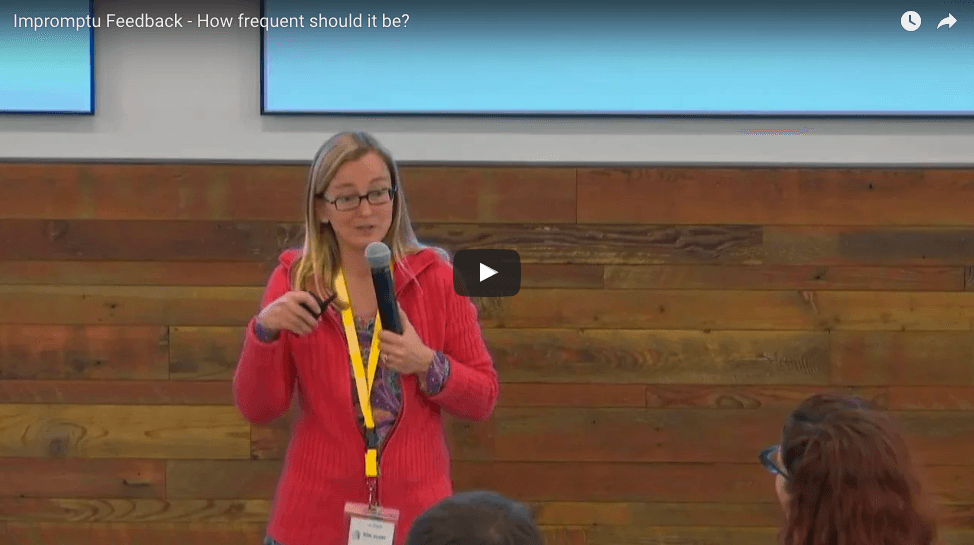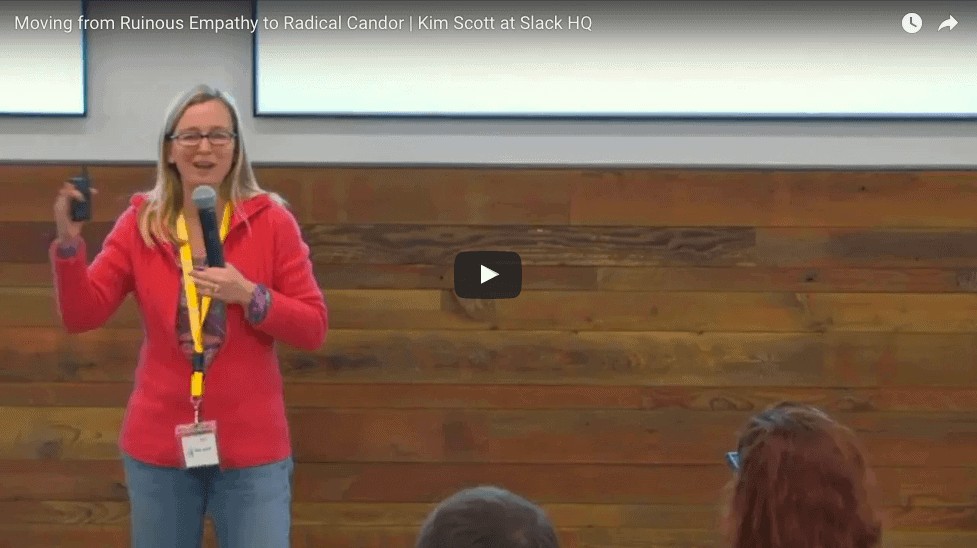Video Tip: Move Your Feedback Away from Ruinous Empathy and Do This Instead
Do you think your feedback is often Ruinously Empathetic? If so, you're not alone. In our experience, most feedback mistakes fall in the Ruinous...

How often should you be giving people feedback? Speaking a few years ago at Slack, I got a question about feedback frequency — how much is too much or not enough?
QUESTION: I feel like I don't find that many opportunities where I can give someone constructive feedback. Am I just ignoring things? How often should one be doing this?
There is one rule of thumb that applies to criticism in general but is especially good advice when you're really busy and nerves are frayed. It's best summed up by advice a friend's godfather gave her at her wedding.
"If it's brown flush it down. If it's yellow let it mellow." She got married on an island with a poor septic system, and this was a sign by all the toilets. But as her godfather said, "These are words to live by. If there's a big stinking problem talk about it before it fouls your relationship. But if it's a small thing, let it go."
ANSWER: You don't need to nitpick every little thing, but if you see something that matters, tell the person.

The atomic building block of Radical Candor is the two-minute impromptu development conversation. If you work remotely, text them or ping people and ask if they have two minutes to chat.
You don’t want to try to operationalize impromptu chats. The motivations of both the feedback giver and the feedback receiver need to be intrinsic.
The motivation to solicit guidance and to act on it is the desire to improve, to grow, to do good work and then make it better, to build strong relationships and then make them stronger.
“I’m listening to you because I want to develop the skills and the team I’ll need to succeed.”
The motivation to give guidance is mostly altruistic—to help another person and the team as a collective flourish.
“I’m telling you this because I want to help you develop the skills you need to succeed and because it’s not fair to your peers if I don’t tell you.”
If you want to set a specific goal, try praising someone three-to-four times a week and giving them one piece of criticism. And remind yourself not to repress feedback — give it immediately.
(Need help with Radical Candor? Let's talk!)
https://youtu.be/wnBl5m44ey4
Impromptu feedback is something you can squeeze in between meetings in two minutes or less.
The best feedback (both praise and criticism) I’ve gotten in my life generally happened in super-quick conversations between meetings or standing waiting for a light to change.
Getting and giving impromptu feedback is more like brushing and flossing than getting a root canal. Don’t schedule it. Just ask for it and offer it consistently and immediately when it’s needed, and maybe you won’t ever have to get a root canal.
However, don't nitpick. I recommend leaving unimportant things unsaid every day.
————————————————————————————————————————————————————————————–
Need help practicing Radical Candor? Then you need The Feedback Loop (think Groundhog Day meets The Office), a 5-episode workplace comedy series starring David Alan Grier that brings to life Radical Candor’s simple framework for navigating candid conversations.
You’ll get an hour of hilarious content about a team whose feedback fails are costing them business; improv-inspired exercises to teach everyone the skills they need to work better together, and after-episode action plans you can put into practice immediately to up your helpful feedback EQ.
We’re offering Radical Candor readers 10% off the self-paced e-course. Follow this link and enter the promo code FEEDBACK at checkout.

Order Kim’s new book, Just Work: How To Root Out Bias, Prejudice, and Bullying to Create a Kick-Ass Culture of Inclusion, to learn how we can recognize, attack, and eliminate workplace injustice ― and transform our careers and organizations in the process.
We ― all of us ― consistently exclude, underestimate, and underutilize huge numbers of people in the workforce even as we include, overestimate, and promote others, often beyond their level of competence. Not only is this immoral and unjust, but it’s also bad for business. Just Work is the solution.
Just Work is Kim’s new book, revealing a practical framework for both respecting everyone’s individuality and collaborating effectively. This is the essential guide leaders and their employees need to create more just workplaces and establish new norms of collaboration and respect.

Do you think your feedback is often Ruinously Empathetic? If so, you're not alone. In our experience, most feedback mistakes fall in the Ruinous...

It's hard to take general management and feedback advice and visualize how to apply it in real-life situations. Some Radical Candor readers have...

We’ve been so excited about all the engagement we’ve gotten from our podcast listeners. We are getting great, thoughtful questions after each...